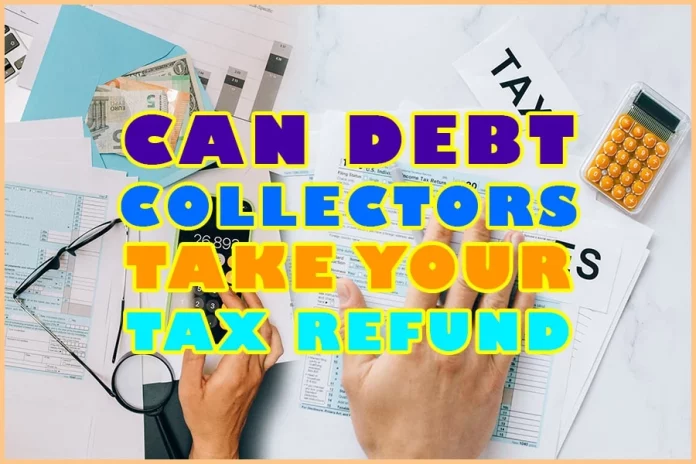Times can be tricky. Especially after the Covid-19 pandemic, the cost of living skyrocketed, and this has seen many Americans struggle to make their ends meet.
Even with the government intervention, the situation has not been relieving to many. As a result, many citizens plunged into debt.
According to financial experts, around 80% of Americans have some form of consumer debt. With many uncertainties in life, you may default on your debt due to unavoidable circumstances.
Then what next? Having overdue debt is the last thing you want. No judging. It happens to quite many Americans.
So you have filed your income tax returns, and you are expecting some refund. If you have outstanding debt, you probably worry that a debt collector might snatch your tax refund.
And it does happen. But before getting deeper into the matter, lets first find out;
Can debt collectors take your tax refund?
Simply put, yes. But the debt collector will first have to levy your bank account by filing a lawsuit against you and obtaining a court order. After which, a portion of funds deposited into the levied account is snatched, including the tax refund.
But there is hope after all. You will be happy to know that these debt collectors are only allowed to take your tax refund by Internal Revenue Services under special circumstances.
By being aware of these circumstances, you get options to play clever and stay safe from their net.
Here Are Circumstances Where A Debt Collector Can Intercept Your Tax Refund
Federal student loan
Some students have managed to clear their debts, while others struggle to clear their dues.
If you happen to have a huge student loan, the Department of Education can work out a plan to offset your student overdue loan by taking your tax refund.
Tax debt – Internal Revenue Service can directly intercept your tax refund to offset whatever funds you owe them.
Lagging behind spousal or child support– the Child Support Enforcement Office can file their request with the Treasury Department to offset your debt. If you are several months behind your child support payment schedule, this will happen.
A little side note
Only three government entities can intercept your tax refund: the Department of Education, Child Support Enforcement, and IRS.
Meaning that other creditors and lenders cannot take your tax refund. If you get threats or messages from a debt collector claiming that they will take your tax refund, they are just bluffing.
And the next course of action would be to file a complaint against them to the Consumer Financial Protection Bureau or Trade Commission.
The law does not allow a debt collector to seize tax refunds because they have many other means to collect such debts. These debts could be medical, auto, or credit card loans.
The most common method is going to court. A debt collector has the option of filing a lawsuit against the defaulter.
After obtaining the judgment, they can then choose to garnish the wages, levy the bank account or impose a lien on a property.
If they levy your bank account, any money deposited will be snatched by the respective debt collector.
Although federal law dictates that only 25% of the total amount can be garnished, you can challenge them in court if they take anything more than that.
Debt Collection Agencies That Can Collect On Behalf Of IRS
The primary function of the IRS is to process federal taxes return and enforce tax law. The bulk of their work involves income taxes for both cooperate and individuals.
In 2015, Congress made it possible for IRS to hire Private Collection Agencies to collect some of its inactive tax receivables.
In simple terms, inactive tax receivables refer to a debt tax that the IRS has removed from its active catalog due to the inability to locate the taxpayer.
Later on, in 2016, the Internal Revenue Service selected four Private Collection Agencies to help collect certain overdue tax accounts.
These include CBE Group, Continental Service Group, Pioneer Credit Recovery, and Performant Recovery Group.
As of September 23, 2021, CBE, ConServe, or Coast Professional, Inc could also contact taxpayers.
All contracted private collection agencies must identify as IRS contractors mandated to collect tax. Before collecting your refund, they also need to inform you by sending an initial contact letter.
IRS may assign your account to PCAs under the following circumstances;
- If 24 months have passed since the last assessment, and the account was not assigned for collection.
- One year has passed, and the taxpayer or his/her representative has not interacted with the IRS.
- If they didn’t have enough resources to locate the taxpayer.
If PCAs contact you and have doubts, don’t provide any financial information or make payments before verifying with the IRS. PCAs don’t have the same power as IRS. There are a few things they cannot do, these include;
- Work out a partial payment installment agreement.
- Consider claim for innocent spouse relief.
- Collect financial information
- Use any type of enforcement action against you.
- Charge fee for setting up a payment agreement
- Update an account into ‘currently not collectible status due to hardship.
However, if you feel under pressure and don’t want to work with the collection agency assigned to you, there is a way out for you. You can submit your request to the agency in writing.
So, under what circumstances can’t the Private Collection Agencies take your refunds?
- When the taxpayer is deceased
- When you are a victim of tax-related identity theft
- When the taxpayer is less than 18 years old
- If you reside in a disaster declared area and seek relief
- When the taxpayer is currently under criminal investigations or litigations
- If the taxpayer is in a combat declared zone
- If you are a recipient of social security disability insurance
- When there is a case of an injured spouse.
A Debt Collector Has Intercepted Your Tax Refund, What Next?
As discussed earlier, creditors and debt collectors can’t directly garnish or intercept your refund.
They can only do so by obtaining a court order after filing a lawsuit against you. If you lose or don’t contest the lawsuit, the collectors are given a writ of garnishment. Don’t lose hope just yet; all is not lost.
You have two options if a debt collector has intercepted your tax refund and you feel like challenging them.
1. Apply for hardship relief
If your refund has been garnished and you feel like you will not be in a position to cover your basic family needs, apply for hardship relief. If successful, no debt collectors, even the IRS, will be allowed to take your tax refund.
2. Ask to receive your tax refund visa prepaid visa or check
Perhaps the cleverest way to protect your tax refund from debt collectors is by asking your tax preparer to send your funds via check or prepaid visa.
It will save you the hassle of rushing to withdraw your funds before debtors seize them. Non-government agencies can’t seize your refunds before its disbursed.
They have to wait until the money is sent to the account. And you can beat them at their own game.
3. Was the interception within the legal framework?
Federal law dictates that only 25% of your total income can be garnished. Many debt collectors, including IRS, don’t give too much attention to the percentages given by the law.
If they garnish more than 25% from your account, you can challenge the matter to the court.
So, you can start by confirming that the amount deducted is within the legal limits as per federal law.
But a proactive approach is the best option for protecting your tax refund from collection agencies.
Rather than waiting for them to seize your funds and fight them, you can apply the following steps to prevent them from taking your funds.
4. Give to Caesar what belongs to Caesar.
Pay your taxes yearly and on time. If you are in a situation where you can manage, make good use of tax debt relief options provided by the IRS.
5. Pay off your students loans.
It’s hard to get away with students loans. The Department of Education will catch up with you one way or the other. You can take various payment options to help you swiftly settle your loans.
6. Apply ‘injured spouse’ clause
You can submit form 8379 and seek relief for an injured spouse. Claim that you have paid all your dues, and you don’t have to ‘pay’ for your spouse’s tax situation.
7. Appeal to court
Depending on why you cannot pay your tax debt, you can appeal to the court.
For instance, if you have difficulty raising child support payments, you can appeal and ask the court to lower the amount due to financial hardship.
8. File separate tax return
To avoid being dragged into unpleasant situations, file your taxes separately with your spouse. In this case, IRS or debt collectors can’t take your refund even if your spouse is in a position to lose his/hers.
Conclusion
While the debt collectors can seize your refunds, they can’t do it before the funds are in your bank account.
And they have to the legal framework they need to follow, starting by filing a lawsuit against you and obtaining a writ of garnishment.
To avoid all these, you can choose to follow the proactive steps discussed in this article. Start by taking your tax burden seriously.












